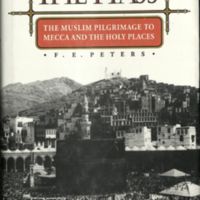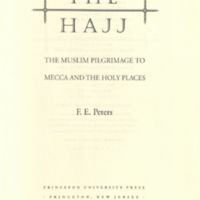The Hajj: the Muslim Pilgrimage to Mecca and the Holy Places
Dublin Core
Title
The Hajj: the Muslim Pilgrimage to Mecca and the Holy Places
Description
Among the duties God imposes upon every Muslim capable of doing so is a pilgrimage to the holy places in and around Mecca in Arabia. Not only is it a religious ritual filled with blessings for the millions who make the journey annually, but it is also a social, political, and commercial experience that for centuries has set in motion a flood of travelers across the world's continents. Whatever its outcome - spiritual enrichment, cultural exchange, financial gain or ruin - the road to Mecca has long been an exhilarating human adventure. By collecting the first-hand accounts of these travelers and shaping their experiences into a richly detailed narrative, F.E. Peters here provides an unparalleled literary history of the central ritual of Islam from its remote pre-Islamic origins to the end of the Hashimite Kingdom of the Hijaz in 1926.
Air travel has now converted what was once a lengthy land or sea voyage into a matter of hours, but the accounts of that earlier, more arduous experience on foot or camelback, under sail or steam, are many and extraordinary. Although overwhelming numbers of travelers have been driven chiefly by piety and God's command, some of them have been European frauds, adventurers, or explorers drawn by the lure, and the danger, of a forbidden experience. Peters has enhanced his presentation of their accounts with an abundance of rare, and in many instances previously unpublished, nineteenth-century photographs of pilgrims and the Islamic Holy Places from the unique collection of the Harvard Semitic Museum, annotated by the curator, Dr. C.E.S. Gavin.
Air travel has now converted what was once a lengthy land or sea voyage into a matter of hours, but the accounts of that earlier, more arduous experience on foot or camelback, under sail or steam, are many and extraordinary. Although overwhelming numbers of travelers have been driven chiefly by piety and God's command, some of them have been European frauds, adventurers, or explorers drawn by the lure, and the danger, of a forbidden experience. Peters has enhanced his presentation of their accounts with an abundance of rare, and in many instances previously unpublished, nineteenth-century photographs of pilgrims and the Islamic Holy Places from the unique collection of the Harvard Semitic Museum, annotated by the curator, Dr. C.E.S. Gavin.
Creator
F.E. Peters
Publisher
Princeton, N.J. : Princeton University Press
Date
1994
Table Of Contents
The Hajj in Early Photo Documents / C.E.S. Gavin -- Ch. I. Origins. The Religion of Abraham. The Primitive Sanctuary. Arabian Paganism. Muhammad and the Hajj -- Ch. II. Mecca and the Ways Thither. Changes in the Haram. The Paths to Mecca. The Ways from Iraq. The Syrian Hajj. The Hajj Route from Egypt. The Interior Arabian Routes -- Ch. III. The Medieval Hajj (1100-1400 C.E.). Ibn Jubayr on the Hajj in 1183-1184. Entering the State of Ihram. The Pilgrimage to Arafat (13 March 1184). The Umra of Rajab. Medina the Radiant -- Ch. IV. Under New Auspices. The Syrian Pilgrimage. The Carriage and Care of Pilgrims. The Bedouin Problem. The Egyptian Pilgrimage. Iranians Make the Hajj. The Caravan as Marketplace in Early Ottoman Times. The Red Sea Crossing. Ali Bey in Mecca (1807). The Wahhabis in Mecca -- Ch. V. Through European Eyes: Holy City and Hajj in the Nineteenth Century. On Making the Hajj under Pretense. Charles Doughty on the Hajj. On First Arriving in Mecca.
Text Item Type Metadata
Original Format
Book
Citation
F.E. Peters, “The Hajj: the Muslim Pilgrimage to Mecca and the Holy Places,” Humanities Hub, accessed February 26, 2026, https://humanitieshub.sdsu.edu/omeka/items/show/1841.


